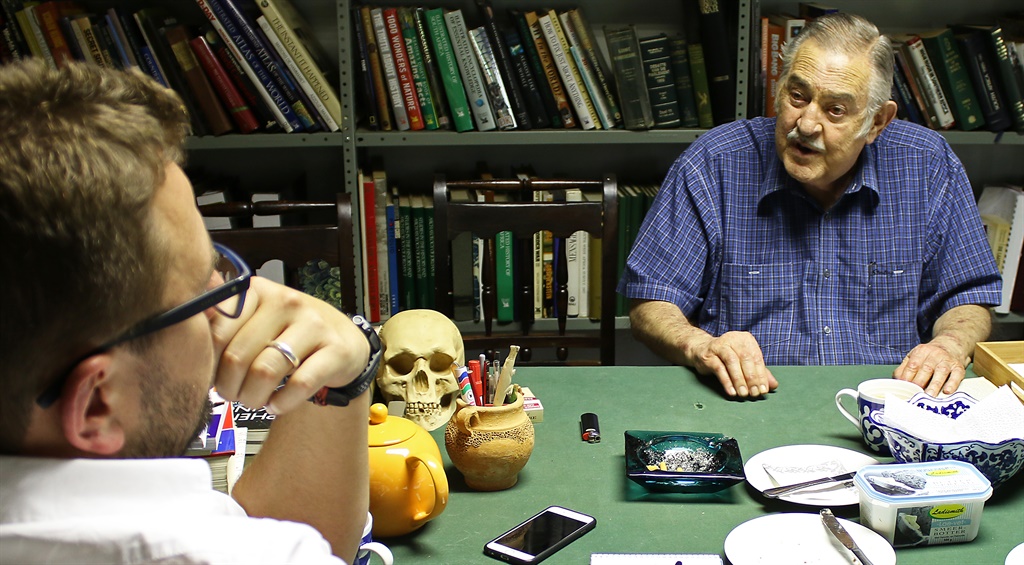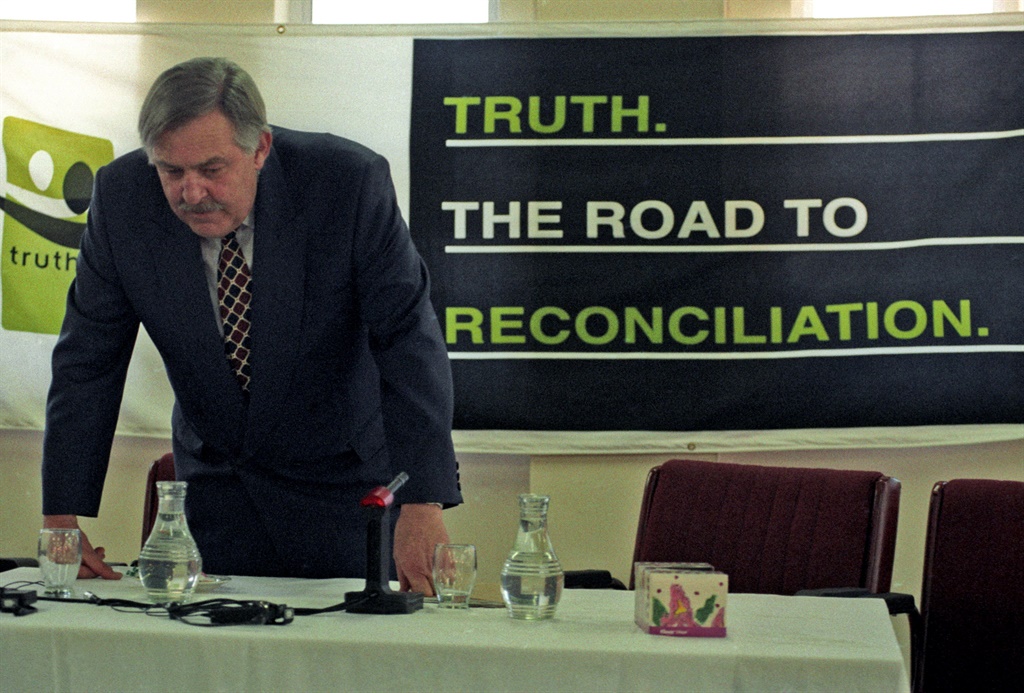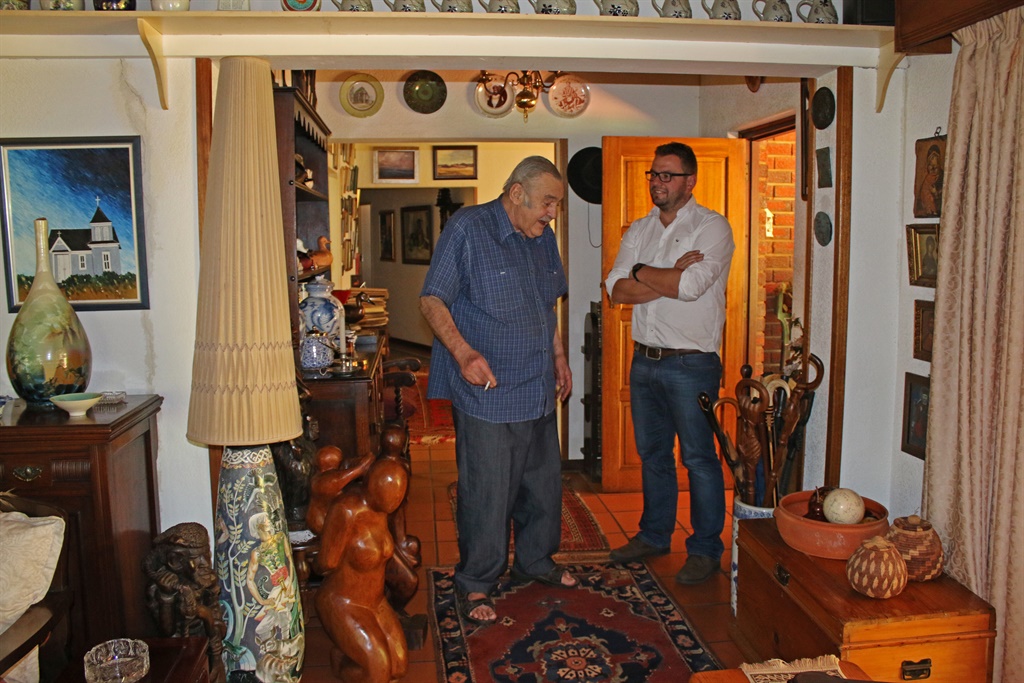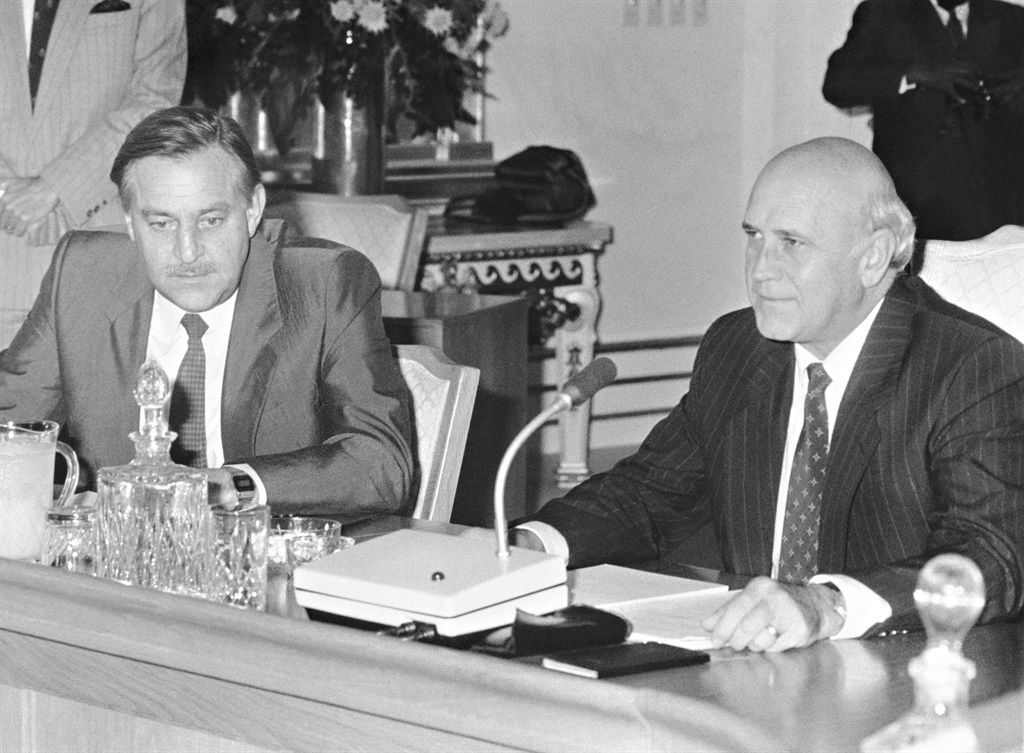
Pik Botha's sprawling smallholding north of Pretoria is a fascinating place. Besides the main house, where he lived with his wife, Ina, there are other homes on the estate as well, where some of his children and workers stayed.
The house itself – his private home where he stayed when he didn't use official state homes while he was in government – is surrounded by enormous indigenous trees, and inside it is furnished with dark wooden furniture. The reception and dining rooms are adorned with gifts and memorabilia from a lifetime in politics and diplomacy; this item a gift from the United Nations secretary general, that one from his friend Henry Kissinger and that carving from Kenneth Kaunda. Everything in Botha's house has a story.
At the back of the house is his library. It is stacked from bottom to top and across rows and rows of shelves with books, photo albums, newspaper cuttings, government papers, court documents, foreign affairs memoranda and everything in between.
On the walls are trophies from his days as hunter as well as framed newspaper reports and cartoons, where he featured regularly during his days in active politics. Tucked away in one corner is an old flag mast with the old national flag hanging limply, possibly from his old office in the east wing of the Union Buildings, where the department of foreign affairs was once housed.
Botha kept copious record of his time in government, once explaining that he had a full documentary account of his period as Minister of Foreign Affairs, as well as an original court record of South Africa's battle in the 1960s at the International Court of Justice to keep hold of South West Africa, later Namibia.
In the middle of the library, near the entrance, is an enormous desk covered in green felt, with more than one chunky ashtray, where he held court among books and notepads. Botha, who was famous among his Cabinet colleagues for his poetry, wrote about many subjects, including creationism and evolution, religion and politics.
The desk was covered with books and papers, notes scribbled all over. He was a big fan – and he said, a friend – of physicist Stephen Hawking, whom he believed to be world's smartest man. They sometimes exchanged letters. Hawking's A Brief History of Time was on the desk the last time I visited.
Across from the library a garage was filled with election posters from his political career. "Botha vir Westdene", read a National Party poster with a picture of a stout and unsmiling Botha on it. "Die Nasionale Party het die antwoord!" (the National Party has the answer!) read another, while still another one had the legend: "De Klerk praat: Johannesburgse stadsaal, 1989" (De Klerk speaks, Johannesburg City Hall, 1989), with a picture of De Klerk in full flight giving a speech.
I got to know Botha long after his political career had ended. He used to call me when I was a parliamentary reporter, asking about events or sittings or what then-president Thabo Mbeki or Jacob Zuma was trying to do. And during recess, when news was slow and briefings at the Union Buildings boring, I sometimes made the short trip to his smallholding on the other side of the Magaliesberg to talk politics and history.
Our conversations ranged from his early days in politics, of peripheral contact with figures like Hendrik Verwoerd and John Vorster, and his more intimate knowledge of PW Botha, FW de Klerk and Nelson Mandela. He often spoke about the disastrous "Rubicon" speech in 1985, during which PW Botha was at his belligerent and insular worst, and spoke of his anger when his efforts to convince the international community that change was in the air was thwarted by the other Botha.
He also spoke about his relationship with De Klerk, and acknowledged that they were never friends. They didn't really have contact in later years and he gave the impression that he was never quite convinced by De Klerk's attempts at reform in the late 1980s.
It was fascinating listening to him talk about the last days of PW Botha, of the turmoil in the party before De Klerk took over and the last days of the apartheid government, with some colleagues wringing their hands in despair at the arrival of democracy. He was quite open about his disappointment when he did not retain the portfolio of foreign affairs in the Government of National Unity after 1994 (how could the apartheid foreign minister speak on behalf of a democratic government?) but told me how the privilege of serving under Mandela eventually made up for that disappointment.
Botha was a major figure during apartheid. He was tasked with selling it abroad and softening the effect of sanctions which was causing the economy major damage in the mid-1980s. This he did by lobbying friendly faces in Washington and London, with many in those two capitals remaining well disposed towards apartheid South Africa during the violent and murderous years before political change.
A question I have always asked of apartheid leaders – and one which I've never really got a satisfactory answer to – was why they took part in a system that was immoral, dishonest and destructive. And did they truly believe that the unbanning of the ANC and the release of Mandela was the morally right thing to do? For De Klerk, morals never entered into it. It was a pragmatic, strategic decision.
This discussion with Botha wasn't as cold as the one with De Klerk. Botha, in his deeply philosophical way, spoke about realising early on in his political career that apartheid would not survive, but that he didn't want to see the country destroyed before change could be effected. There had to be a gradual evolution from apartheid to democracy, he felt. That's why he remained in the system.
He admitted to being a creature of the National Party and he clearly enjoyed the trappings of power, especially that of the minister of foreign affairs. The end of apartheid meant that his relevance ended. He tried to move close to Mandela and wanted to be as indispensable to the new order as he was to the old (Mandela appointed him minister of energy), but there was no chance of that, he came to understand later.
During retirement he remained in contact with Mbeki and the two men also exchanged letters during the latter's presidency, with Botha's criticism sometimes stinging the famously touchy Mbeki. Even though he later publicly supported some of the ANC's policies, he never joined the party and was latterly critical of policies like affirmative action.
Botha was a product of apartheid and as Minister of State in the National Party government he played a leading role in administering and executing policy. As a politician he could adapt his position and amend his views depending on the prevailing winds, as Mac Maharaj told me on Friday. Ben Turok called him "two-faced". Leon Wessels said he was "visionary". As a retiree he was a fascinating witness to some of the country's most crucial moments.
- Pieter du Toit is News24's assistant editor for in-depth news.




 Publications
Publications
 Partners
Partners

























